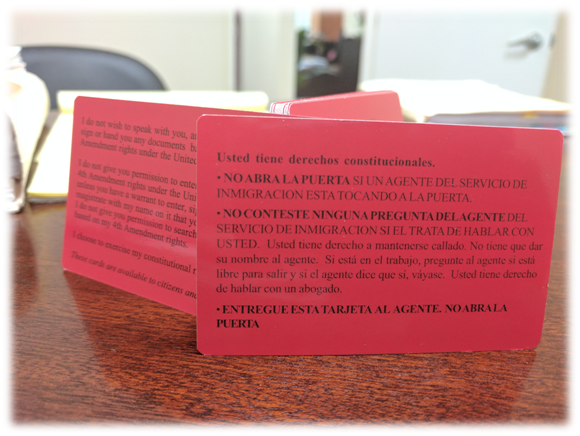
Many immigrants are anxious and uncertain about their future due to the administration’s tough stance on immigration enforcement. Today, we will cover your rights. If an Immigration and Customs Enforcement (ICE) officer comes to apprehend you for whatever reason, understanding your rights can empower you and bring some peace of mind.
The U.S. Constitution provides rights and protections to documented and undocumented immigrants. ICE officers may show up at anytime at your home, work, or in public, but you don’t necessarily have to tell or give them anything. Here are a few key pointers:
You have the right to remain silent, and you do not have to hand over documents.
Do not forget this, and as a general rule, it is probably best to remain silent. You do not have to answer questions or meet demands from ICE officers, including questions regarding where you were born and when you came to the U.S.
Tell the officer that you wish to remain silent and that you would like to speak to your attorney as soon as possible. It is a good idea to have your attorney’s business card handy. If you feel uncomfortable or too intimidated to express these things to the officer, you can obtain a know-your-rights card from our office (pictured above), to simply hand over to the officer.
Please do not lie or present false documents, as doing so can lead to larger issues such as fraud or misrepresentation findings.
You have a right to a hearing before an Immigration Judge in court before removal.
Do NOT sign any paperwork until you have a chance to consult with an immigration attorney. Unless you fully understand a document and know that it won’t hurt you, such as an order of release on your own recognizance, do not feel forced to sign or show anything,
Unfortunately, some ICE officers have been able to demand, intimidate, or coerce an immigrant to basically sign their own deportation from the U.S. and give up their right to a hearing before an Immigration Judge.
These rights apply whether you are at home, at work, or somewhere in public. But, what if you are home and an ICE officer comes knocking?
You are not obligated to open the door. Ask to see the warrant.
Note that there are two types of warrants: administrative and judicial. Ask the officer to show you the warrant, if they have one. If they do not have a warrant, you may refuse to open the door, how menacing and threatening they may be. If they do have a warrant, do not open the door until you see it and confirm what the warrant specifically states. They can slide it under the door, or they can show it to you through a window. If you can, take a picture of it so that your attorney can check it out. Any evidence seized in an unlawful search may ultimately be deemed inadmissible, so it is very important that due process be followed.
Most of the time, ICE officers have administrative warrants, which allow them to arrest an undocumented immigrant, but not enter their home without consent. If this is the case, you have the option of speaking to the officer through the door or window, if you wish. You do not need to let them in, and you do not need to step outside (unless you are okay with the risk of being arrested).
You should be able to recognize a judicial warrant, as you will see a signature block from a U.S. judge, and it will contain much more specific information, including your address and what the officers are looking for with the search warrant. If you do not see a signature from a judge, or if you notice any other problems with the warrant, the “warrant” may not have been properly issued.
Inform Yourself and Be Ready
The information above is general information, but as we always say, everyone’s situation is different. Talk to your immigration lawyer about the specific circumstances of your case. Learning your rights, defenses, and obligations can help prevent ICE from overstepping its boundaries and potentially turning your life upside down.
If you are detained by ICE and do not have an immigration attorney, ask the ICE officer for a list of pro bono attorneys. You can also ask to speak with your consulate, which may offer other legal options for you.
For more information please visit the links below:
https://www.aclu.org/files/kyr/kyr_abra-la-puerta.pdf (sample judicial warrant)